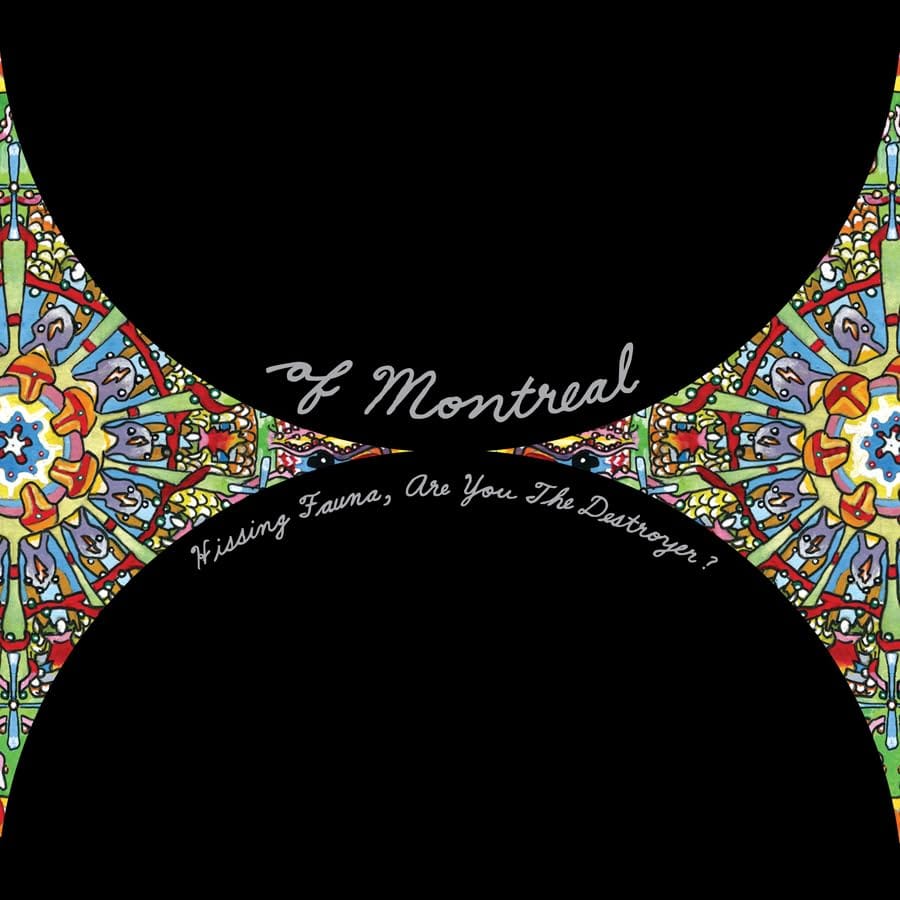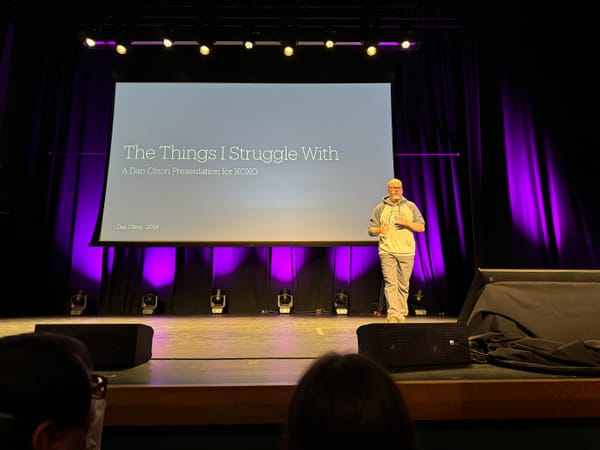Avery's Albums: Issue 1 - "Hissing Fauna, Are You The Destroyer?" by of Montreal

Avery's Albums is my "ongoing" series reflecting on albums that had a significant impact on my life and how my relationship to them has evolved over time. They are not reviews, but it is safe to assume I wholeheartedly recommend every album in the series.
In late autumn 2006, several months before its January 7, 2007 release, "Hissing Fauna, Are You The Destroyer?", the upcoming eighth album by Athens, GA pop outfit of Montreal leaked online. In a stark undercutting of songwriter and front-whatever Kevin Barnes' intentions, the album's planned fanfare-soaked release was surrendered to the whims of fans online; like me.
As a member of some of the more prominent – and heretofore nameless (iykyk) – BitTorrent trackers of the time, getting my hands on this album felt like a crowning moment. At the time, this represented one of the earliest leaks of an album via so-called piracy channels since the launch of Napster some eight years prior. The honor seems to have been lost on Barnes, who stated in numerous interviews how he felt, in a sense, robbed of the ability to surprise and awe people; an understandable sentiment. By the time I attended the first show after the album's release, the whole of every song was near rote to me. I devoured every millisecond of its textured, effusive, and downright catchy-as-all-fuck tracks to the point of meticulous memory before even buying the concert ticket. Barnes may have felt slighted, but the familiarity of the music didn't seem to dull my experience at the live show, and nearly 18 years later, I still find my relationship with the album to be as dynamic as the work itself.
We just want to emote 'til we're dead
Historically, writings about the album insist on establishing the context of the album's origins; the tale of a distraught new father living away from his friends and family in Norway, coping with an existential postpartum despair spiral that ultimately tore his marriage apart, only to find the strength to return to his wife and child and repair it all. I would say I agree with the need to add this context, but only insomuch as it serves to fill in the minor gaps of an otherwise very transparent narrative delivered with the painstaking eloquence Barnes is known for. Beyond that, I don't particularly care about them. The absence of these details does little to derail the concise arc of an emotional meltdown, substance abuse, a flirtation with infidelity, and a looming fear of losing the thing you love most to something you don't even feel equipped to do. These aren’t difficult to suss out of the text. One doesn’t need a backstory to comprehend someone belting, "let's tear our fucking bodies apart" at the top of their lungs in the middle of an eleven minute long tirade of a song. If anything, getting the context was the first time my relationship to “Hissing Fauna” changed.
I’m in a crisis
I’ve never had aspirations of parenthood. In 2007, my latent and unaddressed gender issues—still inert and far away from being discovered—likely offered a subconscious contribution to my own inability to feel safe with commitments of such an extreme nature. The fear ran deep in me like a kind of hyper-vigilance my most base instincts sought to hold in my vision at all times despite being 20 years old, in college, and dating a girl with an equal disdain for child-rearing. I had no reason to consider the implications of parenthood, and yet I was tormented by the risk of an accidental pregnancy and the somehow inevitable burden of having to give up on my own aspirations in order to Get A Job™ and Settle Down™; the pangs of neoliberal living burned in my mind as immutable facts about reality. Reading Kevin’s account of his own arc as it related to the album—his own struggles with accepting, and even finding joy in parenting—altered the way I engaged with the piece. It’s difficult if not impossible now to approach the album or even any individual song on it without holding visions of someone else’s struggle in my mind as I try to sift my own meaning out of it.
There’s nothing wrong with telling the world about where your work comes from. I’m guilty, if anything, of too often expressing a specific fascination for the where, why, and how of art that tangibly affects me the way “Hissing Fauna” does. I wouldn’t even say that I am at a disadvantage now versus when the album existed in my mind without the backstory. It’s all a part of the arc we experience when we bond with a work of art that follows us around for a long time. I don’t have the same feelings about parenthood I once had (for multiple reasons). I’m 37 as I write this, I still have no children, and I’ve listened to “Hissing Fauna” many, many times over. The anxieties the album was once notorious for dredging up are now replaced with the kind of innocent joy eating your favorite desert brings. It’s reached a level of familiarity that, in a way, has stalled the evolution of meaning as far as the total piece is concerned. The main driver of my ever-changing feelings about the songs stems largely from seeing them contextualized next to of Montreal’s later works. A thing that can only happen in the setting of a live show.
It makes you sad on the stage
I’m too old and too traumatized to retain the memory of first listening to “Hissing Fauna.” I can remember a great many detail about my life at the time, and I can remember the show. It was the second of Montreal concert I attended. Newly christened indie-darling MGMT served as the opening act in a moment that truly failed to telegraph the meteoric sensationalism about to overtake the duo in the coming months. The show itself was stark, to say the very least. Thanks to a radical budget increase from the last time I had seen them, afforded by the album’s relatively mainstream success, the stage now had a secondary structure of lit cubes behind the band, forming a bridge atop which pigs and chickens performed choreographed fist fights, masked figures in large cloaks paraded with an eerie gait, and Barnes fenced with ninjas while wearing chain-mail, all the while singing his most vulnerable songs to date with the kind of theatrical aplomb most reminiscent of vaudeville; a common theme in the band’s aesthetic of those years. Seeing this was riveting. It was shocking in a way that made it feel wrong; like bearing witness to a forbidden ritual. Lyrics about misery sung over earworm pop compositions performed with a bizarre and unstable mix of tableaux ranging from the overtly sexual to the downright surreal. This was not an indie rock show. This was an experience separate from the music itself yet inextricably tied to it. I was enchanted. I wanted to live in that moment forever.
of Montreal shows became a sort of Rocky Horror Picture Show affair for me in the years that followed. The band itself titling a subsequent tour the “Gender Mutiny” tour, my aforementioned repressed gender issues leveraged these concerts as a rare opportunity to self-feminize without facing much scrutiny or curiosity from my peers. Heck, I even got some of them in on the deal by letting them do my makeup. It was all about art and fun, right?
Right?
But as time went on, and I lost the energy to bedazzle myself before weeknight shows, the concerts instead became a place where I could find something new in the old. Songs from the band’s now massive catalogue combine to create a kind of sub-narrative about the evolution of an artist who has made his mark on the world by wearing his bleeding heart on his long, glitter-stained sleeve. “Hissing Fauna’s” songs feel like staples, but are shockingly rare these days. I can’t even remember the last time I heard my personal favorite, “Faberge Falls For Shuggie” performed live, but that rarity only makes it punchier should it ever return to the setlist. Barnes’ latest album “Lady On The Cusp” at times feels like an earnest reflection upon his long and tumultuous career going from fringe member of the cult-favorite Elephant 6 Collective to indie-pop darling to niche favorite amongst chronically online queer kids who discovered the band by fishing through their older sibling’s music collection. Hearing these new songs alongside the iconic and tragic “The Past Is A Grotesque Animal” creates a new kind of sensation, distinct from whatever it was I drummed up in my head about the album when I was younger (and had fewer agonies). It tells me I’ve grown too, and I can read my own story by way of these songs. They’ve been with me this whole time, and they serve as a thread to trace back to places and people I may have otherwise forgotten. They are, in many ways, a conduit for my own self-reflection.
Our particles are in motion
I’ll confess outright, “Hissing Fauna, Are You The Destroyer?” is neither my favorite of Montreal album, nor do I agree that it’s Kevin Barnes’ best work, but these are opinions formed in hindsight. In 2007, the album was water to me; an essential part of my emotional nutrition. I couldn’t imagine how he would succeed it properly. In 2024, I can understand the limitations of my own imagination a bit better. I also have other things I’d rather be listening to.
The material experience of listening to “Hissing Fauna” has been dynamic as the album itself. The emotions I’ve associated with it over the years have come and gone. There’s a kind of tranquility that comes with knowing you can turn to an album like this whenever you need it. You run no risk of uncertainty, and almost always leave yourself open to being surprised. Music that connects you to others is special, but music that connects you to yourself is unique.
There’s only now, no ever after.
